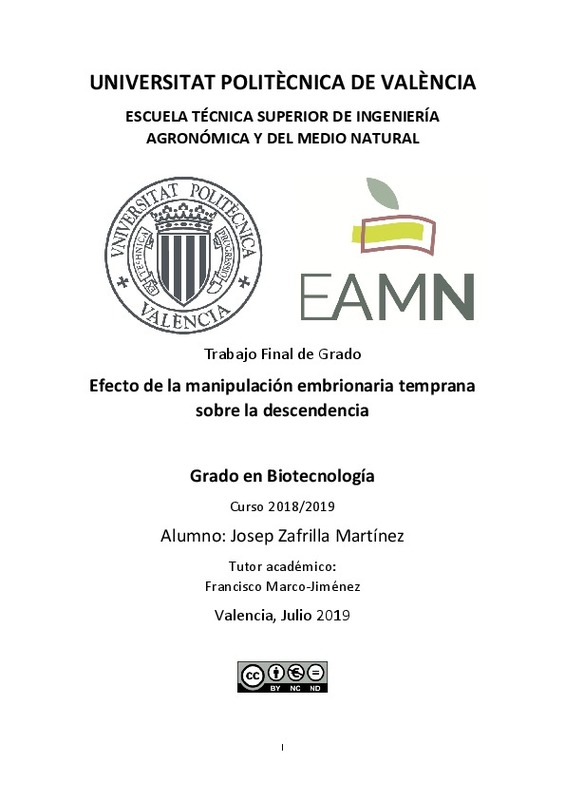JavaScript is disabled for your browser. Some features of this site may not work without it.
Buscar en RiuNet
Listar
Mi cuenta
Estadísticas
Ayuda RiuNet
Admin. UPV
Efecto de la manipulación embrionaria temprana sobre la descendencia
Mostrar el registro sencillo del ítem
Ficheros en el ítem
| dc.contributor.advisor | Marco Jiménez, Francisco
|
es_ES |
| dc.contributor.author | Zafrilla Martínez, Josep
|
es_ES |
| dc.date.accessioned | 2019-09-03T10:21:38Z | |
| dc.date.available | 2019-09-03T10:21:38Z | |
| dc.date.created | 2019-07-23 | |
| dc.date.issued | 2019-09-03 | es_ES |
| dc.identifier.uri | http://hdl.handle.net/10251/124849 | |
| dc.description.abstract | [ES] El uso de las técnicas de reproducción asistida (TRA) ha aumentado mucho en años recientes ya que permiten encontrar una solución a los muchos casos de parejas con infertilidad. No obstante, existen muchos estudios que indican que las TRA no son inocuas, y se asocian a varias alteraciones observadas en la descendencia. El objetivo de este estudio es evaluar el efecto de la transferencia embrionaria sobre la paternidad de la descendencia obtenida utilizando inseminación artificial con mezcla heterospérmica y la calidad embrionaria determinada mediante la expresión de mRNA de genes pluripotentes (OCT4, Sox2 y Nanog). Para llevar a cabo el estudio se realizaron tres sesiones de inseminaciones artificiales con mezcla heterospérmica de 4 machos y se recuperaron los embriones a las 24 horas de la misma. Los embriones recuperados se transfirieron a una hembra receptora y se volvieron a recuperar 6 días después de la inseminación. Para determinar la paternidad de la descendencia se llevó a cabo una amplificación y secuenciación de 5 microsatélites que permitieron obtener el parentesco de los embriones. Para evaluar la calidad embrionaria se analizaron los niveles de expresión de los genes pluripotentes Oct4, Sox2 y Nanog mediante una amplificación a tiempo real. Los resultados del estudio no mostraron variaciones en la paternidad de la descendencia obtenida de una inseminación con mezcla heterospérmica. No obstante, sí se observó un descenso en la calidad embrionaria en términos de una disminución significativa en los niveles de expresión del gen Sox2. | es_ES |
| dc.description.abstract | [EN] The use of assisted reproduction techniques (ART) has increased a lot in recent years as they allow finding a solution to the many cases of infertile couples. However, there are many studies that indicate that ART are not innocuous, and are associated with several alterations observed in offspring. The objective of this study is to evaluate the effect of embryo transfer on the paternity of offspring obtained using artificial insemination with heterospermic mixture and embryo quality determined by the expression of pluripotent gene mRNA (OCT4, Sox2 and Nanog). To carry out the study, three sessions of artificial inseminations with heterospermic mixture of 4 males were carried out and the embryos were recovered 24 hours later. The recovered embryos were transferred to a recipient female and recovered again 6 days after the insemination. To determine the paternity of the offspring, an amplification and sequencing of 5 microsatellites was carried out to obtain the kinship of the embryos. To evaluate the embryo quality, the levels of expression of the pluripotent genes Oct4, Sox2 and Nanog were analyzed by real time amplification The results of the study showed no variation in the paternity of the offspring obtained from an insemination with heterospermic mixture. However, a decrease in embryo quality was observed in terms of a significant decrease in the expression levels of the Sox2 gene. | es_ES |
| dc.format.extent | 47 | es_ES |
| dc.language | Español | es_ES |
| dc.publisher | Universitat Politècnica de València | es_ES |
| dc.rights | Reconocimiento - No comercial - Sin obra derivada (by-nc-nd) | es_ES |
| dc.subject | Conejo | es_ES |
| dc.subject | embrión | es_ES |
| dc.subject | blastocisto | es_ES |
| dc.subject | expresión génica | es_ES |
| dc.subject | manipulación embrionaria | es_ES |
| dc.subject | desarrollo embrionario | es_ES |
| dc.subject | paternidad | es_ES |
| dc.subject | técnicas de reproducción asistida | es_ES |
| dc.subject | transferencia embrionaria | es_ES |
| dc.subject | microsatélite | es_ES |
| dc.subject | Rabbit | es_ES |
| dc.subject | embryo | es_ES |
| dc.subject | blastocyst | es_ES |
| dc.subject | gene expression | es_ES |
| dc.subject | embryo manipulation | es_ES |
| dc.subject | embryonic development | es_ES |
| dc.subject | paternity | es_ES |
| dc.subject | assisted reproduction techniques | es_ES |
| dc.subject | embryo transfer | es_ES |
| dc.subject | microsatellite | es_ES |
| dc.subject.classification | PRODUCCION ANIMAL | es_ES |
| dc.subject.other | Grado en Biotecnología-Grau en Biotecnologia | es_ES |
| dc.title | Efecto de la manipulación embrionaria temprana sobre la descendencia | es_ES |
| dc.type | Proyecto/Trabajo fin de carrera/grado | es_ES |
| dc.rights.accessRights | Abierto | es_ES |
| dc.contributor.affiliation | Universitat Politècnica de València. Departamento de Ciencia Animal - Departament de Ciència Animal | es_ES |
| dc.contributor.affiliation | Universitat Politècnica de València. Escuela Técnica Superior de Ingeniería Agronómica y del Medio Natural - Escola Tècnica Superior d'Enginyeria Agronòmica i del Medi Natural | es_ES |
| dc.description.bibliographicCitation | Zafrilla Martínez, J. (2019). Efecto de la manipulación embrionaria temprana sobre la descendencia. http://hdl.handle.net/10251/124849 | es_ES |
| dc.description.accrualMethod | TFGM | es_ES |
| dc.relation.pasarela | TFGM\111552 | es_ES |
Este ítem aparece en la(s) siguiente(s) colección(ones)
-
ETSIAMN - Trabajos académicos [3541]
Escuela Técnica Superior de Ingeniería Agronómica y del Medio Natural






